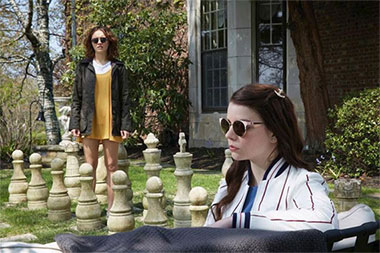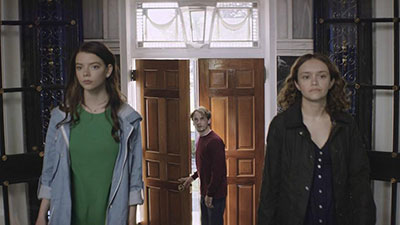Movie Review: ‘Thoroughbreds’
Good Breeding Gone Bad

 Is there any word that evokes wealth more than “thoroughbreds”? They’re the prized horses owned by the ultra-rich – a mascot of the high-class, old-money crowd. In the first 30 seconds of Thoroughbreds, we’re introduced to a quiet, low-lit scene of a girl and her horse. Then she takes out a knife. The film’s tagline is “Good Breeding Gone Bad,” and until you make it to the film’s glorious final frame, you don’t know the half of it.
Is there any word that evokes wealth more than “thoroughbreds”? They’re the prized horses owned by the ultra-rich – a mascot of the high-class, old-money crowd. In the first 30 seconds of Thoroughbreds, we’re introduced to a quiet, low-lit scene of a girl and her horse. Then she takes out a knife. The film’s tagline is “Good Breeding Gone Bad,” and until you make it to the film’s glorious final frame, you don’t know the half of it.
Amanda (Olivia Cooke) and Lily (Anya Taylor-Joy) were best friends back in middle school, but have since lost touch over the years. Amanda is something of an outcast after the aforementioned violent incident involving her family’s horse, and is now awaiting trial for animal cruelty. By her own admission, she doesn’t have any feelings whatsoever. Sure, she might feel hungry or tired sometimes, but happiness and sadness? Those completely evade her. Lily, on the other hand, is her complete opposite. On the outside, she’s prim and proper – the picture of perfection. She feels everything too strongly, and no emotion takes higher precedence than her complete and utter disdain for her stepfather Mark (Paul Sparks).
 “Do you ever think about just killing him?” Amanda casually asks Lily. “What, and spend the rest of my life in jail?” she replies. Language is key here. It’s not a bad idea because it’s morally wrong; it’s a bad idea only if they get caught. Enter Tim (Anton Yelchin), the small-time drug dealer that Lily and Amanda offer $100,000 to off Mark. In suburban Connecticut, money can buy everything.
“Do you ever think about just killing him?” Amanda casually asks Lily. “What, and spend the rest of my life in jail?” she replies. Language is key here. It’s not a bad idea because it’s morally wrong; it’s a bad idea only if they get caught. Enter Tim (Anton Yelchin), the small-time drug dealer that Lily and Amanda offer $100,000 to off Mark. In suburban Connecticut, money can buy everything.
A high fashion Heavenly Creatures with a healthy dose of satire thrown in, Thoroughbredsis a masterpiece of the Toxic Teen Friendship subgenre (i.e. Heathers, Thirteen, Heavenly Creatures, Jawbreaker and 2014’s Breathe). In these films, teen girls form bonds so intense, that they often start to take on aspects of each other’s personalities. They’re symbiotic beings – for better or for worse. Arguably more incisive than those films that came before it, this is a major cult classic in the making
Written and directed by first-time filmmaker Cory Finley, Thoroughbreds is an astonishing debut film. Sleek and dripping in style, Finley has a knack for making single settings utterly cinematic; tracking shots and focus racks are used to monumental effect here, and his ability to dramatize moments that are off screen is remarkably assured. Unexpected sounds haunt every moment – most notably the incessant sound of Mark’s rowing machine, a constant reminder of his unwanted presence. And then there’s Erik Friedlander’s wonderfully cacophonous score, with its jarring, screeching elements, that has us just the right amount on edge. All the while, Finley manages to maintain the two-hander play vibe that resonates throughout the entire film, which is filled with whip-fast back-and-forth dialogue that cuts like a knife.
And then, none of this would be possible were it not for Thoroughbreds’ two extraordinary leads.
It feels strange to call an admitted sociopath endearing, but that’s exactly what Cooke’s Amanda is. Throughout the film’s 92-minute runtime, Cooke unveils every shade of deadpan imaginable, and her comic timing is underplayed and on-point. It’s clear she so badly wants to make a connection with someone, and it just so happens that that someone turns out to be Lily. Both of these characters have a façade, and finding out their true nature is the psychological mystery at the heart of the film. But it’s Lily who most viewers will crave to do a mental autopsy on. Deliberately inscrutable until the final frame, Taylor-Joy is icy cold and shut off in a way totally unlike her counterpart. It’s clear that underneath Lily’s perfectly styled hair and chic designer clothes lies some serious turmoil, though it’s only when she meets someone that doesn’t care about anything that she can show the chinks in her armor. And they are big, nasty chinks indeed.
In Thoroughbreds, no one that inhabits the screen is a stereotypically “good” person. Amanda and Lily are seriously contemplating blackmail and murder; Tim is a registered sex offender that sells drugs to high school students; Lily’s mom is vain and oblivious to everything going on in her tumultuous household; and Mark doesn’t seem to care about anyone or anything except for his juice cleansing diets and his rowing machine.

“In your brain, all these people are little offshoots of your consciousness. We’re all your maids, your cleaning ladies, your personal trainers,” Mark tells Lily towards the film’s final act. It’s true that he’s unkind, but he’s not off-base. In a few simple words, he categorizes her perfectly. She’s not clinically a sociopath like Amanda. But she’s so entitled, so sickeningly selfish, that it leads easily to moral bankruptcy. Lily sheds her remaining morality as easily as she ditches her couture frocks for baggier, I-don’t-give-a-shit ensembles. And it’s those little details that make Thoroughbreds the kind of movie that opens up in new, fascinating ways upon each subsequent viewing.
Growing up, “treat people the way you want to be treated” is a sort of cliché mantra. If empathy is taught from a young age, can we choose to unlearn it? And if you’re born and bred as a part of the bougie upper crust, is it not likely that the empathy you learned is especially fragile to begin with? We all have the capacity for apathy. But if apathy is something we repress to remain “good,” these two wild things are running free.
RATING: A
Thoroughbreds is now playing at O Cinema Wynwood. For more information and tickets, click here.

Lauren Cohen was born and raised in Miami Beach and graduated from the University of Miami with a bachelor’s degree in Motion Pictures. She has been writing about film since 2009, with her movie reviews and features appearing regularly in Examiner.com and Miami Beach News, among others. She’s interviewed some of the most recognizable faces in the film industry, including Daniel Craig, Emma Stone, Channing Tatum, Joseph Gordon-Levitt and Javier Bardem. An avid supporter of the arts, Lauren also works with the Miami Film Festival to promote the best of world cinema to the Miami community.

